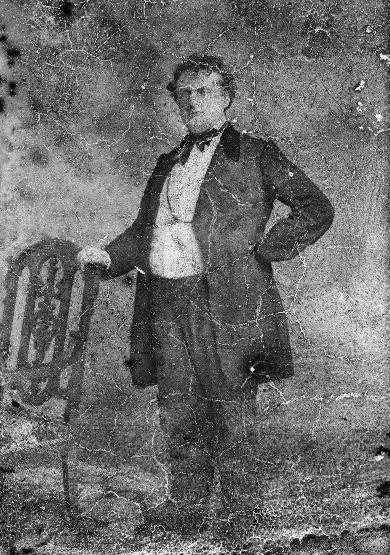- John Albion Andrew
Infobox Governor
name= John Albion Andrew
caption=
order=25th
office= Governor of Massachusetts
term_start=January 3 ,1861
term_end=January 4 ,1866
lieutenant=John Z. Goodrich (1861)John Nesmith (1862)Joel Hayden (1863-1866)
predecessor= Nathaniel P. Banks
successor=Alexander H. Bullock
birth_date= birth date|1818|5|31|mf=y
birth_place=Windham, Maine
death_date= death date and age|1867|10|30|1818|5|31|mf=y
death_place=Boston, Massachusetts
spouse= Eliza Jane Hersey
religion=
profession= Lawyer
party= Republican
footnotes=John Albion Andrew (
May 31 ,1818 ndashOctober 30 ,1867 ) was a U.S.political figure . He served as theGovernor of Massachusetts between 1861 and 1866 during the tumultuousAmerican Civil War . He was a guiding force behind the creation of some of the firstU.S. Army units of black men—including the famed54th Massachusetts Infantry .Early life and career
John A. Andrew was born in
Windham, Maine . His father, Jonathan Andrew was a descendent from an early settler of Boxford, Massachusetts and a small but prosperous trader in Windham. His mother, Nancy Green Pierce, was a teacher at Fryeburg Academy. John Albion was the eldest son. His mother died in 1832.Andrew entered
Bowdoin College in 1833. Although he was studious and popular with other students, he did not shine academically and was ranked near the lowest in his class. After his graduation in 1837, he moved to Boston to study law under Henry H. Fuller, with whom he became close friends.Andrew married Eliza Jane Hersey of Hingham on Christmas evening, 1848. They had four children: John Forrester, born Nov. 26, 1850; Elizabeth Loring, born July 29, 1852; Edith, born April 5, 1854; Henry Hersey, born April 28, 1858.
After his admission to the bar, Andrew joined the Whig party and began to support the anti-slavery movement. In 1848, he helped organize the
Free Soil Party , which opposed the expansion of slavery. Following the failure of the Free Soil Party, Andrew joined the Republican party in the mid-1850's.He was elected to as a Representative in the General Court in 1857. Following John Brown's 1859 raid on Harper's Ferry, Virginia, Andrew participated in organizing legal aid for Brown, generating favorable responses amongst the people of Massachusetts. In 1860, he was elected governor of Massachusetts by a huge margin.
Governor of Massachusetts
in 1862 and early 1863.
Andrew's strong feelings about emancipation are clearly expressed in the following quote from an 1862 speech:
Andrew was receptive to the concept of using black men as uniformed soldiers in the
Union army . Working closely with the Federal government and withFrederick Douglass , he authorized the formation of two regiments of black infantry, the 54th and 55th Massachusetts, composed of blacks from the state, as well asOhio ,New York ,Pennsylvania , and other states. Shortly after theBattle of Antietam , Andrew became one of the leading state executives at the LoyalWar Governors' Conference inAltoona, Pennsylvania , which ultimately backed Lincoln'sEmancipation Proclamation and the war effort.In 1864, Andrew wrote a letter to
President Abraham Lincoln describing a woman named Lydia Bixby who lost five sons in battle and asking Lincoln to express his condolences. Lincoln then sent the famousLetter to Mrs. Bixby to Bixby, who turned out to not only dislike Lincoln, but was also a Confederate sympathizer.He left the office of governor in 1866 and again took up the practice of law, although he intended to remain active in politics. Having associated with the Radical Republicans during the war, Andrew took a more conciliatory tone towards Reconstruction, and did not favor some of the Radical Republicans' more extreme measures.
He died in 1867 of
apoplexy after havingtea at his home in Boston. He is buried in the Hingham (Old Ship) Cemetery in Hingham, Massachusetts.Honors and memorials
In 2007, governor
Deval Patrick hung Andrew's portrait over the fireplace in his office, calling him an inspiration.John A. Andrew St., in the Jamaica Plain section of Boston, is named in his honor, and his name is one of four on the Soldier's Memorial in the same community.
John Andrew Hospital inTuskegee, Alabama is named for him. [cite book |last=Watson |first=Wilbur H. |authorlink= |coauthors= |editor= |others= |title=Against the Odds: Blacks in the Profession of Medicine in the United States |origdate= |origyear= |origmonth= |url=http://books.google.com/books?id=bBdzgGN6OJYC&pg=PA68&lpg=PA68&dq=andrew+hospital+tuskegee+governor&source=web&ots=Wh0ZnzFkl2&sig=PyL-3-TQFbtKryOau5FAV0nY0wk#PPA68,M1 |format= |accessdate=2008-02-20 |accessyear= |accessmonth= |edition= |series= |date= |year=1999 |month= |publisher=Transaction Publishers |location=New Brunswick, NJ |language= |isbn=9780585324166 |oclc=45843812 |doi= |id= |pages=p 68 |chapter= |chapterurl= |quote=]References
*
* [http://www.mass.gov/statehouse/massgovs/jandrew.htm Official Commonwealth of Massachusetts Governor Biography]External links
* [http://www.jphs.org/people/2005/4/14/john-a-andrew.html Jamaica Plain Historical Society]
Wikimedia Foundation. 2010.
